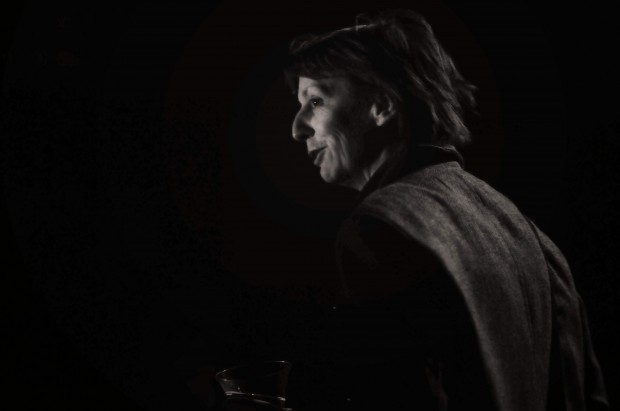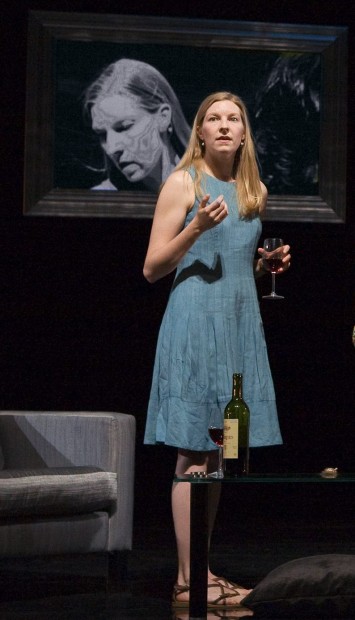Indie Caucus and CAEA membership speak out for reform – Tent Talk Saturday at Toronto Fringe
The Indie Caucus will host a Tent Talk in the Fringe HQ that is the parking lot behind Honest Eds as part of The Toronto Fringe Festival Saturday at 4pm.
The Tent Talk will cover: A history of the Indie Caucus and its dealings with CAEA since 2007, the results from the massive turnout at Theatre Passe Muraille for the Regional Annual General Meeting to address the growing indie theatre crisis in May, and where things stand with the newly created, but thus far completely silent, Independent Theatre Review Committee created to address these issues.
The event will be moderated by Ontario CAEA CPAG chair Aaron Willis with three panelists:
 Margaret Evans, Praxis Theatre
Margaret Evans, Praxis Theatre
Franco Boni, Theatre Centre
Julie Tepperman, Convergence Theatre
All of the panelists have been members of the Indie Caucus since its inception, have had multiple dealings with Equity as both member and non-member creators, and will offer insight and advice on what the future holds in this regard for independent artists and what they can do promote positive change within CAEA.
Clearly this issue is incredibly important to all artists at different stages of their careers and there is growing anger and frustration that even after two heavily lopsided votes (96-1 anyone?), the largest turnout ever at a RAGM to address this issue, and the creation of a new committee to look into the problem – NOTHING HAS ACTUALLY CHANGED YET. Despite all of these meetings and votes, practically speaking, it is still 2005.
Below, three CAEA members who are not members of the Indie Caucus, share their hopes and throughts for reform after attending the now-legendary Theatre Passe Muraille RAGM:
Susan Coyne
I was surprised, when I was working on an independent theatre show, to hear my young colleagues talk about how reluctant they were to join Equity. They felt that joining Equity would make it too difficult for them to produce and perform their own work. This seemed very strange to me, as a longtime member of CAEA.
At the meeting, I sensed a huge frustration from the artists who spoke about the rules for producing independent theatre in Equity’s jurisdiction. There seemed to be a disconnect between what the artists were saying and Equity’s description of the problem. For the Equity officers who were at the meeting, the problem was described as a problem of manpower: given how small the number of Equity artists employed in independent theatre, a lot of people’s time was spent filling out an enormous amount of paper work. This seemed slightly to miss the point. Though I can understand that the Equity office may be shortstaffed. I would have liked to see some kind of acknowledgement that though the numbers may be small, this kind of work, with its willingness to take risks and experiment with new ideas, is the well from which we all draw. We are all, in my experience – inspired, invigorated and challenged by seeing, and participating in independent theatre, and I hope that we can find a way to not only support and encourage these companies and artists, but make it easier for them to do what they do, within Equity.
The Ontario CPAG (Council Policy Advisory Group) Equity meeting was encouraging and inspiring. The turnout at Theatre Passe Muraile was more than respectable. I recognized friends and colleagues who have been doing great work in Toronto for years.
I am grateful to Mark Brownell and his team for putting a positive spin on the event. We were encouraged to think of solutions, not just tell horror stories. Mark did a great job of providing a context and the background for the struggle that a lot of Equity creator-producers face when it comes to working within the rules. His pie chart showed three-percent of work that Equity members do fall under these different creator-producer categories yet the majority of staff hours are used to facilitate them.
VInetta Strombergs chaired a panel featuring Equity members Rebecca Northan, Melissa D’Agostino and Michael Rubenfeld. They shared their obstacles, successes and suggestions. I was also pleased that President Arden Ryshpan and Executive Director Allan Teichman were invited to weigh in. It was all very conciliatory.
We all treated each other with respect and were constructive in our criticism. The many door prizes were a very nice touch. It felt like we were being rewarded for attending and making it all the way through to the end.
I am filled with hope that an easy to manage contract will be developed and not the (in the words of Ross Manson, Volcano Theatre) ad hoc system that exists now.
Maev Beaty
So I begin with a confession. I have been an Equity member for several years now. I have produced, written, acted, festivaled, deputied, worked under Guest Artist, Co-op and Indie. I have also complained, been denied, been scolded, been furious and yes, I have been helped. But I have also heard of hypocrisies and confusions that made my hair stand on end. So what is the confession? I have never been to a meeting, rally or parade. I have paid my dues and bitched in bars, but I have never actually tried to involve myself in or be an active witness of the actual machinations of CAEA.
But boy do I love Facebook. I really do. I use it for networking, education, alternative news sources, entertainment and reunions. And thanks to Facebook I finally became involved in my Association’s future. I received probably 40 reminders about the big CAEA May 17th meeting from probably 20 different sources. And it worked. I went. And I am so glad I did.
I deeply appreciated how pro-active and transparent the organizers were and how efficiently the evening was handled. As a ‘newbie’, I never felt condescended to or confused. There was minimum complaining and a lot of honesty. In fact, there was a lot of honesty about dishonesty. A major recurring theme of the evening was that producer/members frequently lied on contracts or simply worked outside them. There are many reasons for this course of action, chief among them being the hassle of negotiating the overly complex and confusing contract options, and the feeling that they were being seen as exploitative and suspicious by CAEA staff. This information came out in the evening not as a complaint, but as a clear sign to staff and council that our system is flawed and requires re-examining. Nobody WANTS to lie. But we need to change things so that’s not the easiest solution.
So – what kind of change? There were several suggestions of improvements and adjustments made that night. Below is the short list of the solutions I was most excited by:
- Eradicate the graduated system that forces companies to have a limited number of times they can use certain contracts before they must use another.
- Get rid of the quota of CAEA members that must be in your production when the producer/originator of the project is a Member/Engager.
- Create a menu prototype for contracts, with choosable options for each module and then provide a sample template that matches your chosen contract to help you fill it out. (it could all be done online – colour coded menu pieces that you pick and choose)
- Create a clear series of riders that could be easily ‘tacked on’ to that contract that deals with issues such as Touring or using dancers, non Equity or International performers without making them join the Association
- Make the Fringe Waiver applicable to ALL SummerWorks productions.
Change is GOOD. Yes it was my first CAEA meeting but it sure won’t be my last.





Recent Comments